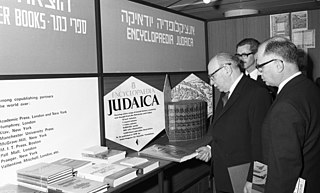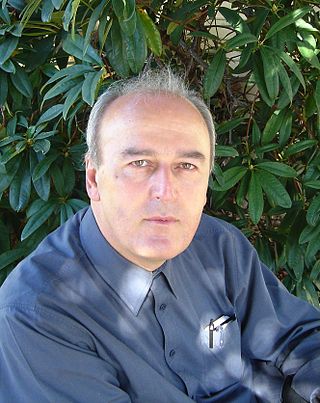Related Research Articles
AakKorean pronunciation:[a.ak] is a genre of Korean court music. It is an imported form of the Chinese court music yayue, and means "elegant music". Aak was performed almost exclusively in state sacrificial rites, and in the present day it is performed in certain Confucian ceremonies.

The Encyclopaedia Judaica is a 22-volume English-language encyclopedia of the Jewish people, Judaism, and Israel. It covers diverse areas of the Jewish world and civilization, including Jewish history of all eras, culture, holidays, language, scripture, and religious teachings. First completed in 1971–1972, the encyclopedia had been published in two editions by 2010, accompanied by a few revisions.
Bruno Nettl was an ethnomusicologist who was central in defining ethnomusicology as a discipline. His research focused on folk and traditional music, specifically Native American music, the music of Iran and numerous topics surrounding ethnomusicology as a discipline.

Hormoz Farhat was a Persian-American composer and ethnomusicologist who spent much of his career in Dublin, Ireland. An emeritus professor of music, he was a fellow of Trinity College, Dublin. Described by the Irish Times as a "gifted and distinctive composer of contemporary classical music," his compositions include orchestral, concertante, piano and choral music, as well string quartets and chamber works. He also wrote numerous film scores, including that of Dariush Mehrjui's 1969 film The Cow. However, his musicological research dominates his legacy; his writings on the music of Iran—a country which he insisted be called 'Persia'—were pivotal in ethnomusicology, particularly his acclaimed 1990 study The Dastgah Concept in Persian Music.
Sean Williams is an ethnomusicologist who teaches at The Evergreen State College in Olympia, Washington.

Meena Alexander was an Indian American poet, scholar, and writer. Born in Allahabad, India, and raised in India and Sudan, Alexander later lived and worked in New York City, where she was a Distinguished Professor of English at Hunter College and the CUNY Graduate Center.
Norris J. Lacy is an American scholar focusing on French medieval literature. He was the Edwin Erle Sparks Professor Emeritus of French and Medieval Studies at the Pennsylvania State University until his retirement in 2012, a position he had held since 1998. He is a leading expert on the Arthurian legend and has written and edited numerous books, papers, and articles on the topic. In 2014 the International Arthurian Society, North American Branch, presented him an award for Lifetime Service to Arthurian Studies.

Joann Wheeler Kealiinohomoku (1930–2015) was an American anthropologist and educator, co-founder of the dance research organization Cross-Cultural Dance Resources (CCDR). She has written and/or edited numerous books and articles, including contributions on dance-related subjects to multiple encyclopedias, such as writing the entry for "Music and dance in the United States" in the Garland Encyclopedia of World Music. Some of her best-known works are "An anthropologist looks at ballet as a form of ethnic dance" (1970) and "Theory and methods for an anthropological study of dance" (1976). An associate professor of anthropology at Northern Arizona University, she was named professor emerita in 1987. In 1997, she received the first annual award for "Outstanding Contribution to Dance Research" from Congress on Research in Dance. In 2000, the CCDR collection was named by President Bill Clinton's White House Millennium Council, as something that needed to be preserved under the "Save America's Treasures" program.

Gerard Henri Luc Béhague was an eminent Franco-American ethnomusicologist and professor of Latin American music. His specialty was the music of Brazil and the Andean countries and the influence of West Africa on the music of the Caribbean and South America, especially candomblé music. His lifelong work earned him recognition as the leading scholar of Latin American ethnomusicology.
Stephen Edward Koss was an American historian specialising in subjects relating to Britain.

Joseph Jordania is an Australian–Georgian ethnomusicologist and evolutionary musicologist and professor. He is an Honorary Fellow of the Melbourne Conservatorium of Music at the University of Melbourne and the Head of the Foreign Department of the International Research Centre for Traditional Polyphony at Tbilisi State Conservatory. Jordania is known for his model of the origins of human choral singing in the wide context of human evolution and was one of founders of the International Research Centre for Traditional Polyphony in Georgia.

The term African fiddle may be applied to any of several African bowed string instruments.
Judith O. Becker is an American academic and educator. She is a scholar of the musical and religious cultures of South and Southeast Asia, the Islamic world and the Americas. Her work combines linguistic, musical, anthropological, and empirical perspectives. As an ethnomusicologist and Southeast Asianist, she is noted for her study of musics in South and Southeast Asia, including Javanese gamelan, Burmese harp, music and trance, music and emotion, neuroscience, and a theoretical rapprochement of empirical and qualitative methods. Becker teaches at the University of Michigan. In 2000, Becker was named the Glenn McGeoch Collegiate Professor of Musicology at the University of Michigan, and she was named professor emerita of music in 2008. From 1993 to 1997, she was a Senior Fellow of the Michigan Society of Fellows.
Stephen Blum is an American scholar and musician, whose research has primarily been in ethnomusicology. He has lent a multidisciplinary approach to the writing and publication of numerous articles discussing a wide range of musical topics and ideas.

Anne K. Rasmussen is an American educator and ethnomusicologist. Much of her research focuses on Arab music in the US and Islamic ritual and performance. She has been the director of the William & Mary Middle Eastern Music Ensemble since 1994. Rasmussen was named the William M. and Annie B. Bickers Professor of Middle Eastern Studies in 2014.
A Theka literally means "support, prop". The term also refers to a musical composition in classical Indian music for percussion instruments that establish a rhythm (Chanda), beats (Matras) and the metric cycle of beats (Tala) in a performance. An example is the theka of Dadra Tal: "Dha Dhi Na / Na Ti Na".
Kay Kaufman Shelemay is the G. Gordon Watts Professor of Music and Professor of African and African American Studies at Harvard University. She received her PhD in Musicology from the University of Michigan and won a Guggenheim Fellowship in 2007. Shelemay was elected to the American Philosophical Society in 2013.
Mardani Jhumar( also Mardana Jhumar) is a Nagpuri folk dance performed by men in the Indian states of Jharkhand, Chhattisgarh and Odisha. It is performed after harvest in fair. Men wear ghongroo, hold sword, shield and dance in a circle by holding each other's hand. Musical instruments used in this dance are mandar, nagara, dhak and Shehnai or bansi. The dance movement reflects masculine energy. Sometimes women dancers accompany them, who are known as Nacni.
References
- ↑ Druesedow, John E. (March 2000). "Reference Sources". Notes . 56 (3): 611–619. JSTOR 899645.
p. 614: "... Sachs, Frances Densmore, and many others, but nearly the whole century passed before such a comprehensive series as The Garland Encyclopedia of World Music"
- ↑ Clark, Joe C. (June 2011). "Reviewed Work: The Garland Encyclopedia of World Music Online". Notes . 67 (4): 798–800. JSTOR 23012842.